|
November 2013 • Vol. 3 • Issue 3
Oncology Kudos
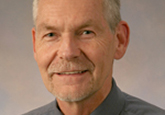
|
| Dietmar W. Siemann, Ph.D. |
|
Research grant awarded
Dietmar W. Siemann, Ph.D., a professor of radiation oncology and associate chair for research, received a five-year, $1.5 million NIH/NCI R01 grant for his proposal entitled, "Targeting Cathepsin L: A Novel Strategy to Impede Prostate and Breast Cancer Metastasis." |
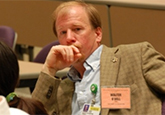
|
| Walter O'Dell, Ph.D. |
|
O'Dell named senior member of SPIE
Walter O'Dell, Ph.D., an assistant professor of radiation oncology, is elected to the International Society for Optics and Photonics as a senior member. Known as SPIE, the society views this grade of membership as a step toward becoming a fellow of the society. |
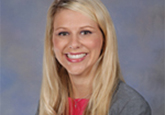
|
| Julie Greenwalt, M.D. |
|
Resident receives award
Julie Greenwalt, M.D., a resident in radiation oncology, received the W. Martin Smith Interdisciplinary Patient Quality and Safety Award. Greenwalt's award-winning proposal is titled, "Reducing Errors in Radiation Treatment through the Implementation of Electronic Safety Checklists within the University of Florida Department of Radiation Oncology." |
|
|
Article selected as Molecular Cancer Therapeutics Editors' Pick
"Small-Molecule Inhibitors of Acetyltransferase p300 Identified by High-throughput Screening are Potent Anticancer Agents" was featured as the editors' pick for the May issue of Molecular Cancer Therapeutics. The editors determined the article, a collaborative work between laboratories at UF, Scripps Florida, and Reaction Biology Corp., to be a "must read." Authors: Heng Yang, Christie E. Pinello, Jian Luo, Dawei Li, Yunfei Wang, Lisa Y. Zhao, Stephan C. Jahn, S. Adrian Saldanha, Peter Chase, Jamie Planck, Kyla R. Geary, Haiching Ma, Brian K. Law, William R. Roush, Peter Hodder and Daiqing Liao.
Read more |
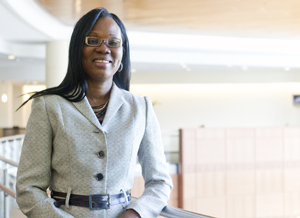
|
| Folakemi Odedina, Ph.D |
|
Odedina tapped to deliver the inaugural Barbara Terry Koroma Lecture
Folakemi Odedina, Ph.D., a joint professor of radiation oncology and pharmaceutical outcomes, will give the inaugural Barbara Terry Koroma Lecture at the Department of Defense on Dec. 4 in Frederick, Md. Dr. Barbara Terry-Koroma was the champion of establishing the prostate cancer disparity funding mechanism at DOD and died last January. Odedina is the first speaker of the lecture series. |
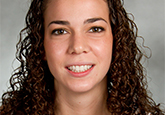
|
| Leylah Drusbosky |
|
Graduate student receives travel grant
Leylah Drusbosky, a doctoral student in the interdisciplinary program in biomedical sciences, received an Achievement Award from the American Society of Hematology (AHS) for her research poster entitled, "Bone Marrow Endothelial Cells Protect Acute Myeloid Leukemia from Chemotherapy by Direct Contact: The BCAM/Laminin/VLA5 Axis as a Potential Therapeutic Target." Drusbosky will present her research at the AHS 55th annual meeting in December. |
In The News
|
|
Florida coastal seaweed could help the body fend off cancers
Scientists have long believed that seaweeds, a staple of Asian diets, may lower cancer risk in Western populations. Hendrik Luesch, Ph.D., an associate professor of medicinal chemistry in the UF College of Pharmacy, offers the first investigation of seaweed's cellular functions, revealing specific mechanisms that contribute to its anti-inflammatory and anti-tumor properties and identifying its active chemical ingredients.
Read more
|
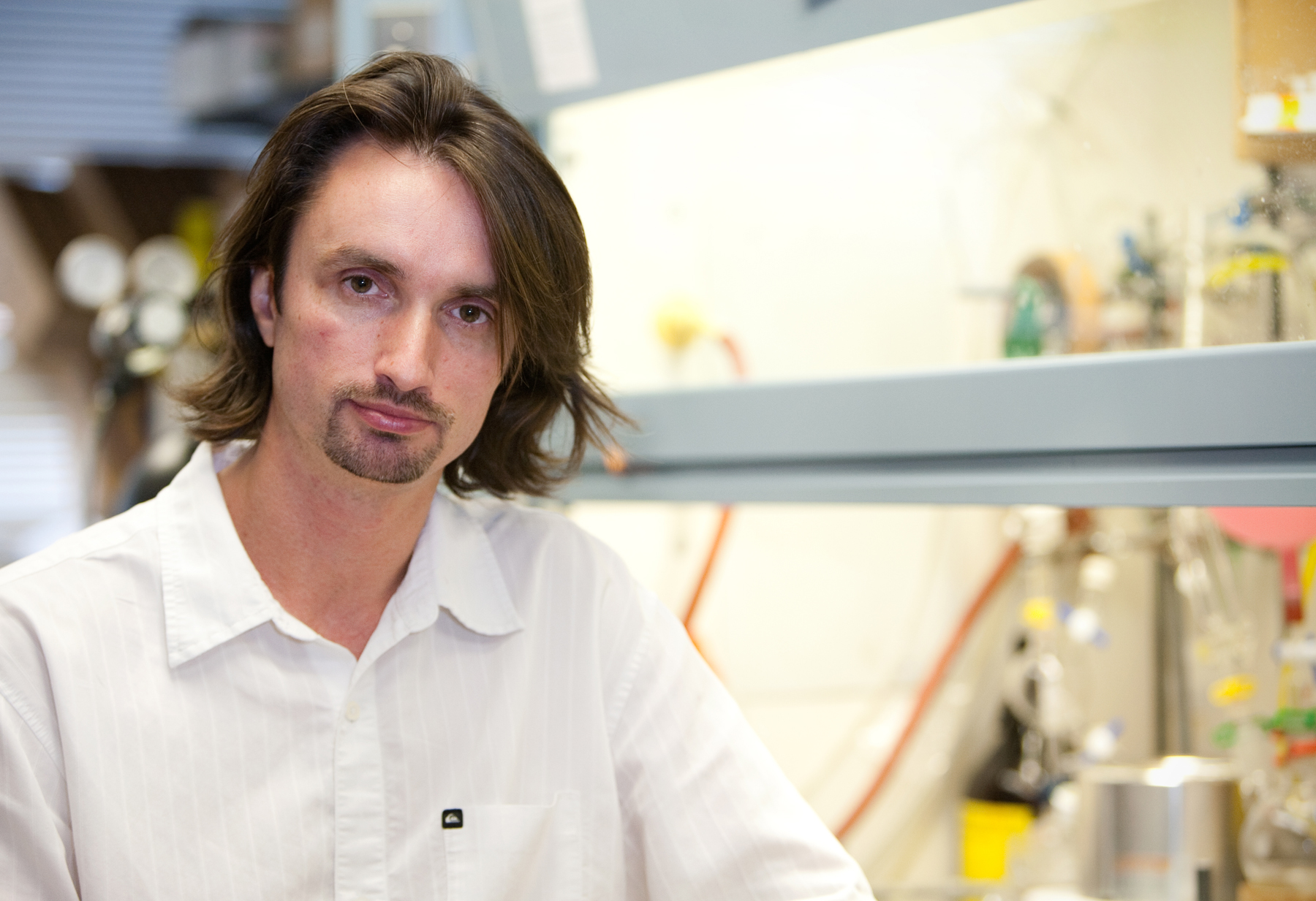
|
| Hendrik Luesch, Ph.D. |
|
Center for Natural Products, Drug Discovery and Development (CNPD3) established
Led by Hendrik Luesch, Ph.D., center director and an associate professor of medicinal chemistry in the UF College of Pharmacy, CNPD3's mission is to foster early-stage drug discovery by providing the infrastructure, chemical libraries and expertise to screen for disease-relevant targets and for drug-like disease-modifying molecules that modulate target activity. The chemical focus of the CNPD3 is on unique natural products, and the goal is to fully exploit the biosynthetic as well as therapeutic potential of untapped biodiversity for drug discovery.
Read more |
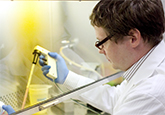
|
| Florian Siebzehnrubl, Ph.D. |
|
Discovery of pathway for deadly cancer could lead to better diagnosis, treatment
University of Florida Health researchers have discovered a molecular pathway involved in the deadly spread of glioblastoma, the most lethal kind of brain cancer. Their findings, which appear in the advanced online edition of EMBO Molecular Medicine, may help physicians make better decisions about treatment and assist researchers pinpoint targets for therapeutic drugs that may help as many as 50 percent of all patients diagnosed with glioblastoma.
Read more
|
|
Your spare change can make a difference
The Climb for Cancer Foundation's Harriet's Helping Hand program provides food vouchers, gas cards, and lodging to cancer patients and their families during vital treatment for their cancer. Canisters will be placed on the counters in Kangaroo Express convenience stores during November to collect patrons' spare change toward the effort. Last year's effort raised $35,000 in gas cards. The Kangaroo Gas Card Fundraiser ends Nov. 30. Donate today!
|
Clinical Trials
A Phase III Randomized Study of Oral Sapacitabine in Elderly Patients with Newly Diagnosed Acute Myeloid Leukemia (CYC682-12)
This Phase 3 study assesses two drug regimens as the initial treatment of patients who are at least 70 years of age and have newly diagnosed acute myeloid leukemia (AML) for whom the doctor does not recommend the use of standard intensive treatment or the patient has decided not to receive standard intensive treatment after being fully informed about its benefits and risks by his/her doctor. The two drug regimens are sapacitabine administered in alternating cycles with decitabine, or decitabine alone. The purpose of the study is to learn which drug regimen is more likely to keep AML in check as long as possible.
Protocol No. 20101382
Principal Investigator:
Maxim
Norkin, M.D., Ph.D. |
Lenalidomide and Dexamethasone plus MLN9708/placebo for relapsed or refractory Multiple Myeloma
The purpose of this research study is to determine whether adding MLN9708 to the combination of lenalidomide and dexamethasone improves survival in patients with multiple myeloma whose disease is no longer responding or has not responded to previous treatment.
Protocol No. 20121029
Principal Investigator: Jan Moreb, M.D.
|
A Randomized Phase II Study of Azacitidine in Combination with Lenalidomide (NSC-703813) vs. Azacitidine Alone vs. Azacitidine in Combination with Vorinostat (NSC-701852) for Higher-Risk Myelodysplastic Syndromes (MDS) and Chronic Myelomonocytic Leukemia (CMML)
Drugs used in chemotherapy, such as azacitidine, work in different ways to stop the growth of cancer cells, either by killing the cells or stopping them from dividing. Lenalidomide may stop the growth of cancer cells by stopping blood flow to the cancer. Vorinostat may stop the growth of cancer cells by blocking some of the enzymes needed for cell growth. It is not yet known whether azacitidine is more effective with or without lenalidomide or vorinostat in treating myelodysplastic syndromes or chronic myelomonocytic leukemia.
This randomized phase II trial studies how well giving azacitidine works with or without lenalidomide or vorinostat in treating patients with higher-risk myelodysplastic syndromes or chronic myelomonocytic leukemia.
Protocol No. 442-2012
Principal Investigator: Jack Hsu, M.D. |
A Randomized, Multicenter, Open-Label Phase III Study to Evaluate the Efficacy and Safety of Trastuzumab Emtansine Versus Trastuzumab as Adjuvant Therapy for Patients with HER2-Positive Primary Breast Cancer Who Have Residual Tumor Present Pathologically in the Breast or Axillary Lymph Nodes Following Preoperative Therapy
Primary Outcome Measures: Invasive disease-free survival (IDFS): Time from randomization to ipsilateral invasive breast tumor recurrence, ipsilateral local-regional invasive breast cancer recurrence, distant recurrence, contralateral invasive breast cancer, or death of any cause Secondary Outcome Measures: Invasive disease-free survival including second non-breast cancers Disease-free survival: Time from randomization to first occurrence of an IDFS event including second primary non-breast cancer or contralateral or ipsilateral ductal carcinoma in situ Overall survival: Time from randomization to death of any cause Distant recurrence-free interval: Time from randomization to date of distant breast cancer recurrence Safety: Incidence of adverse events Incidence of cardiac events: Death from cardiac cause or severe chronic heart failure (NYHA Class III or IV) Patient reported outcomes: European Organization for Research and Treatment of Cancer (EORTC) Quality of Life Quetionnaire QLQ-C30/QLQ-BR23, EuroQol EQ-5d Questionnaire
Protocol No. 20130316
Principal Investigator: Karen Daily, D.O. |
A Randomized Phase II study of MK-3475 versus chemotherapy in patients with Advanced Melanoma
Randomized study for intravenous IV MK-3475 versus chemotherapy in patietns with advanced Melanoma refractory to ipilimumab
Protocol No. 20121298
Principal Investigator: Stephen Staal, M.D. |
A Phase III Randomized Trial for Patients with de novo AML using Bortezomib and Sorafenib (IND#114480; NSC#681239, NSC#724772) for Patients with High Allelic Ration FLT3/ITD
1. To compare event-free survival (EFS) and overall survival (OS) of patients with de novo acute myeloid leukemia (AML) with or without high allelic ratio FLT3/ITD+ mutations who are randomized to standard therapy versus bortezomib/standard combination therapy. 2. To determine the feasibility of combining bortezomib with standard chemotherapy in patients with de novo AML. 3. To compare the OS and EFS of high-risk patients treated with intensive Induction II with historical controls from AAML03P1 and COG-AAML0531. 4. To determine the feasibility of combining sorafenib with standard chemotherapy in patients with de novo high allelic ratio FLT3/ITD+ AML.
Protocol No. AAML1031
Principal Investigator: William Slayton, M.D. |
A Phase II Randomized Trial of Lenalidomide (NSC # 703813, IND # 70116) in Pediatric Patients with Recurrent, Refractory or Progressive Juvenile Pilocytic Astrocytomas and Optic Pathway Gliomas
To determine the objective response rate of children with recurrent, refractory or progressive juvenile pilocytic astrocytomas and optic pathway gliomas who are treated with Regimen A low-dose (20 mg/m2/dose) or Regimen B high-dose (115 mg/m2/dose) lenalidomide.
Protocol No. ACNS1022
Principal Investigator: William Slayton, M.D. |
Pre-Treatment Assessments of Somatosensory Abnormalities Related to the Development of Chemotherapy-Induced Neuropathy
Sponsors: UF Health Cancer Center and UF Pain Research & Intervention Center of Excellence (PRICE)
This study is being done to learn why individuals experience abnormal sensory symptoms over the course of chemotherapy. Abnormal sensory symptoms can include numbness, tingling, and pain. These symptoms can occur in the hands, feet, and face. This is called chemotherapy-induced peripheral neuropathy. These symptoms can be different in patients treated with taxanes, platinum, or vinca alkaloids compounds.
Your participation in this project will require two visits to the College of Dentistry in Gainesville and completing a series of questionnaires during your chemotherapy treatment and following your last treatment. Participation in this research is voluntary. You may withdraw from the study at any point and for any reason or refuse to answer any question. If you participate:
- We will test how sensitive you are to a range of sensory stimuli on your face, hand, and foot. We will also test how your sensitivity changes to heat while your hand or foot is in cold water. The sensory test will be administered before your first chemotherapy treatment. We will repeat these tests 3 months following your last treatment.
- We will ask you to describe your symptoms for about a week following several treatment cycles and one and three months following treatment with a series of commonly used questionnaires.
- We would like to collect two additional samples of blood at each clinical visit at the UFSCC (UF Shands Cancer Center). We want to look at genes and chemicals in your blood that may be related to numbness, tingling, and pain.
Principal Investigator: Chris King, Ph.D. |
|
Mark Your Calendar!
LifeSouth "Bleed for Your Team" Blood Drive
Nov. 18 - 29, Monday - Friday
9 a.m. - 5 p.m.
UF Health Shands Hospital Atrium
When you bleed for your team, everyone wins!
Hold the Date!
Celebration of Excellence
Jan. 29, 5 - 6:30 p.m.
Cancer Genetics Research Complex
Join us for an evening reception and awards ceremony to celebrate and honor the outstanding work of our cancer researchers, clinicians and educators.
Contact Us
Do you have a great story, or have you been honored with an award or had research accepted for publication? Let us know! We'll include it in the Cancer Connection eNews, which is distributed monthly to UF Health Cancer Center members and the faculty and staff of the center's multidisciplinary cancer programs during the fall and spring semesters. Send your news to:
Lindy Brounley
Communications Director
UF Health Cancer Center
Phone: 352-273-8013
E-mail: brounley@ufl.edu

|